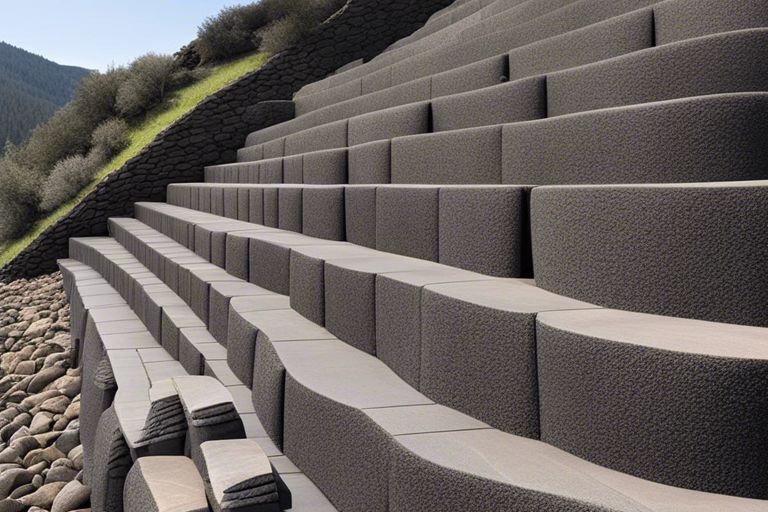There’s a growing interest in using basalt chips as a sustainable solution for erosion control in landscaping. If you’re looking to enhance your outdoor space while effectively managing soil erosion, basalt chips offer numerous durable and environmentally friendly benefits. Their unique properties not only allow for effective water drainage but also provide a visually appealing finish that blends seamlessly with your landscape. In this post, we’ll explore why basalt chips might just be the perfect choice for your next landscaping project.
Key Takeaways:
- Durability: Basalt chips are highly resistant to weathering and degradation, making them a long-lasting solution for erosion control.
- Stability: Their interlocking shape provides excellent stability, preventing soil erosion and maintaining healthy landscapes.
- Aesthetic Appeal: The natural appearance of basalt chips enhances visual landscapes while serving functional purposes in erosion management.
The Unique Properties of Basalt Chips
Before delving into why basalt chips are an ideal choice for erosion control, it’s imperative to understand their unique properties. These properties not only contribute to the aesthetic value of your landscape but also serve practical purposes that enhance soil stability and prevent erosion.
High Density and Durability
Properties of basalt chips include high density and exceptional durability, making them an outstanding choice for landscape applications. When you select basalt chips, you are opting for a material that can withstand significant pressure and wear over time. The density of these chips means they less likely to be displaced by harsh weather conditions, foot traffic, or water runoff. This allows them to remain in place and perform their erosion control duties more effectively.
Moreover, durability is a defining characteristic of basalt chips. Unlike lighter materials, such as wood mulch or some types of gravel, basalt doesn’t break down, degrade, or wash away easily. This means you won’t find yourself constantly replenishing your landscape stones, allowing you to save both time and costs in the long run. The long-lasting nature of basalt ensures that your landscaping remains intact and effective for years to come.
Resistance to Weathering and Erosion
Density is another vital aspect of basalt chips that affords them impressive resistance to weathering and erosion. Due to their igneous origin, basalt possesses a tight molecular structure that inhibits water absorption, making these chips highly resistant to both chemical and physical weathering. As a result, when placed in areas prone to erosion, you can rely on basalt chips to maintain their integrity despite relentless rain, wind, or temperature fluctuations.
This resistance to weathering ensures that the chips will not break down or lose their effectiveness over time. Because basalt does not erode easily, you are investing in a product that continues to provide soil stabilization and aesthetic appeal throughout varying weather conditions. It’s a choice that guarantees you peace of mind, knowing your landscape will remain beautiful and functional while combating the forces of nature. With basalt chips, you’re not just choosing a stone; you’re reinforcing your landscape’s defense against erosion effectively.
The Importance of Erosion Control in Landscaping
Any responsible landscaper understands the critical need for effective erosion control measures. Erosion is a natural process that occurs when wind, water, or other forces wear away soil, rock, or sediment from your landscape. However, when left unchecked, erosion can lead to significant problems, including damage to your property, loss of soil health, and negative impacts on local waterways. By proactively managing erosion, you can protect your landscape, enhance its aesthetic appeal, and contribute to environmental sustainability.
Preventing Soil Loss and Sedimentation
The prevention of soil loss is paramount in maintaining the integrity of your landscape. Soil erosion can lead to severe degradation of your land, making it less productive and impairing its ability to support plant life. With proper erosion control strategies, such as the use of innovative landscape stones like basalt chips, you can significantly reduce the effects of water runoff, which is one of the primary culprits of soil loss. As a result, your plants can thrive in a stable environment, and you avoid the costly consequences of lost soil.
Additionally, sedimentation can lead to local water bodies being clogged with soil particles, disrupting aquatic ecosystems. You play a crucial role in managing these processes in your landscaping. By employing effective erosion control measures, you not only preserve your own landscape but also protect local waterways, contributing to a healthier environment for everyone.
Maintaining Soil Quality and Fertility
Soil is the foundation of your landscaping, and maintaining its quality and fertility is crucial for the health of your plants. Erosion not only removes valuable topsoil but also diminishes the crucial nutrients needed for plant growth. By implementing erosion control techniques, you can ensure that your soil remains rich and fertile, which in turn supports vibrant vegetation and reduces the need for chemical fertilizers that can harm your landscape in the long run.
It is important to understand that healthy soil is a living entity, full of microorganisms and nutrients that benefit your plants. When erosion occurs, these vital components are washed away, leaving your landscape vulnerable and less capable of sustaining plant life. By taking measures to control erosion, including the use of basalt chips, you safeguard the long-term fertility of your soil, ensuring that your landscape remains lush and productive season after season.

How Basalt Chips Mitigate Erosion
Once again, the importance of effective erosion control cannot be understated, particularly in landscaping and land management. Basalt chips are increasingly recognized for their ability to not only enhance aesthetic appeal but also to play a vital role in erosion control. Your use of basalt chips in your landscaping projects will provide you with significant benefits, both functionally and visually, while ensuring that your soil remains intact and stable.
Stabilizing Soil and Preventing Slippage
An imperative way basalt chips mitigate erosion is by stabilizing soil and preventing slippage. By applying a layer of these durable chips, you create a physical barrier that helps to hold your soil in place, especially on slopes and inclined areas. The interlocking nature of the chips allows for an effective weight distribution that truly supports the soil beneath, making it less susceptible to the forces of gravity and water runoff. Consequently, your landscaping will be more resilient, drastically reducing the likelihood of soil displacement.
In addition, the angular shape of basalt chips provides grip for the soil, ensuring that it remains more secure than it would with smoother materials. This unique feature is critical in preventing landslides and other forms of soil erosion that can occur during heavy rainfall or when exposed to fluctuating weather conditions. By effectively reinforcing your slopes with basalt chips, you are taking a proactive step toward maintaining the integrity of your landscape.
Reducing Water Flow and Runoff
Basalt chips also play a significant role in reducing water flow and runoff, further aiding in erosion control. By creating a barrier that encourages water to percolate through rather than run off, you can significantly decrease the speed at which water travels across your landscape. This important function helps to minimize the impact of rain and surface water, thus reducing erosion caused by fast-flowing liquid.
Another advantage of incorporating basalt chips into your landscape design is their ability to enhance water retention in the soil. This characteristic is beneficial, as it allows for better absorption of moisture and nutrients, promoting a healthier environment for your plants. Consequently, you not only combat erosion but also create a thriving ecosystem. The natural composition of basalt ensures that these chips resist weathering and degradation over time, maintaining their effectiveness in the long run. Overall, using basalt chips is a smart choice for anyone looking to enhance soil stability and minimize erosion in their outdoor spaces.
The Benefits of Using Basalt Chips for Erosion Control
Unlike other types of landscape stones, basalt chips offer a unique combination of physical properties that make them highly effective for erosion control. These volcanic stones are highly durable and have a unique angular shape that helps them interlock and resist displacement by water or wind. This quality is crucial for maintaining the integrity of your landscaping and preventing soil erosion. Additionally, you can explore more about different landscape rock solutions through resources like Purposeful Rock Landscaping: Solutions for Drainage & Erosion Control.
Cost-Effective and Low Maintenance
Any savvy homeowner knows the importance of budget management when it comes to landscaping. Basalt chips are notably cost-effective compared to many other erosion control solutions. Once installed, they require minimal upkeep, allowing you to save both time and money in the long run. With their ability to withstand various weather conditions, you won’t need to frequently replace them, making them a smart investment for your property.
Furthermore, because basalt chips do not decompose or degrade over time, you can enjoy a long-lasting solution without the constant worry of erosion or maintenance. This less demanding nature means that you can focus more on enjoying your outdoor space and less on labor-intensive upkeep, which adds to their appeal for busy homeowners.
Aesthetically Pleasing and Versatile
Chips made from basalt not only serve a functional purpose but also enhance the visual appeal of your landscape. Their rich, dark color provides a striking contrast against the greenery of your plants and grass, adding depth and interest to your outdoor space. This versatility extends beyond just aesthetics, as you can use basalt chips in various landscape designs—from garden paths to decorative borders—effectively integrating them into your overall scenery.
For instance, if you are looking to create a modern or natural look, the neutral tones of basalt chips work seamlessly with diverse plants and features in your yard. You’ll find they can be used to create beautiful rock gardens or as a base for hardscaping elements like patios and walkways. Their durability and versatility offer you countless design options while ensuring that your landscape remains effective at controlling erosion.
Comparison with Other Landscape Stones
After considering your landscaping needs, it’s important to evaluate how basalt chips stack up against other popular landscape stones such as gravel and decomposed granite. The following table provides a straightforward comparison between these materials to help you make an informed decision.
Landscape Stone Comparison
| Feature | Basalt Chips |
|---|---|
| Durability | High durability, resistant to weathering |
| Weight | Heavier than gravel but lighter than large rocks |
| Color Variation | Typically dark, providing a unique contrast |
| Drainage | Excellent drainage properties |
| Installation | Easy to install with minimal maintenance |
Advantages over Gravel and Decomposed Granite
For those who prioritize sustainability and long-term performance in their landscape, basalt chips offer several significant advantages over gravel and decomposed granite. One of the main benefits is their high durability, which means they withstand harsh weather conditions better than many alternatives. This ensures your landscape will remain visually appealing year-round without the frequent need for replacement or maintenance. Additionally, their darker color provides a striking contrast to vibrant plant life, adding visual depth to your garden aesthetics.
Another key advantage is their excellent drainage capabilities. Unlike certain varieties of gravel that may compact over time, basalt chips retain their form and allow water to flow freely through. This reduces the risk of water pooling and subsequent erosion, making basalt an ideal choice for erosion control in your landscape. When you choose basalt chips, you’re not just enhancing your garden’s beauty but also investing in a solution that actively protects your soil and surrounding plants.
Disadvantages and Limitations of Basalt Chips
Granite, while appreciated for its unique aesthetic qualities, can present some challenges when compared to basalt chips. One of the primary limitations of basalt chips is their availability; they may not be as widely accessible as gravel or decomposed granite in certain regions. Additionally, because basalt chips are heavier, they can be more challenging to transport and install than lighter alternatives.
To further elaborate, the cost of basalt chips can also be a deterrent for some. While they may offer exceptional durability and physical properties, their price may be higher than common gravel or decomposed granite options. This could make basalt chips less appealing for large-scale projects, especially if budget constraints are a significant consideration. Therefore, it’s crucial for you to weigh the advantages against the potential disadvantages to ensure you select the best natural stone for your landscape needs.
Installation and Maintenance Tips
Not every stone is equally suited for your landscaping needs, but when it comes to basalt chips, you are making a decision that benefits erosion control in multiple ways. Proper installation and upkeep are crucial to maximizing their effectiveness. Here are some important tips to keep in mind:
- Before installation, clear the area of any debris or existing vegetation.
- Ensure you have a stable, level base for your basalt chips to prevent shifting over time.
- Consider using a landscape fabric to reduce weed growth while allowing water drainage.
- Apply a generous layer of basalt chips (at least 2-3 inches) to optimize erosion control.
- Regularly assess your landscape and replenish the chips as necessary to maintain effectiveness.
Perceiving these steps as fundamental will ensure your basalt chips perform their best for erosion control and contribute positively to your landscape design.
Preparing the Site and Laying the Basalt Chips
Chips play an vital role in landscaping, especially when you aim to combat soil erosion. First, assess the area where you intend to lay the basalt chips. Remove any unnecessary vegetation and debris to create a clear working space. This preparation helps you achieve a more efficient installation process and allows water to flow freely into the ground, enhancing the erosion control capabilities.
Once the site is prepared, lay down a layer of landscaping fabric to act as a barrier against weeds. This step is vital as it allows for efficient drainage while preventing unwanted plant growth, which can disrupt the stability of your basalt chips. Count on a thickness of 2-3 inches of basalt chips to ensure optimal performance and proper coverage.
Regular Inspection and Upkeep
An ongoing commitment to regular inspection of your basalt chips landscape will safeguard against issues that could thwart your erosion control efforts. Routinely check for any displaced chips, and replenish areas that have experienced significant erosion. Pay close attention to the integrity of your landscaping fabric as well, ensuring it remains intact and effectively suppressing weeds.
Site maintenance doesn’t stop at just replacing lost chips; you should also monitor the area for signs of excessive moisture or any pooling of water, which can indicate underlying drainage issues. Doing so protects your landscaping investment, enables the continued effectiveness of the basalt chips, and maintains the aesthetic appeal of your outdoor space. Regular upkeep ensures that your erosion control measures stay effective and that your landscape remains vibrant and healthy.
Summing up
Presently, as you consider landscape solutions for erosion control, basalt chips stand out due to their unique properties and effectiveness. These natural stones are not only durable and long-lasting, but their angular shape allows them to interlock, creating a stable surface that effectively prevents soil displacement. Their dark color absorbs heat, aiding in moisture retention, which further helps to preserve your landscaping during dry seasons. Additionally, their porous nature promotes drainage, reducing the risk of water pooling that can lead to erosion and other landscaping issues.
By incorporating basalt chips into your erosion control efforts, you are making a wise investment in maintaining the integrity of your landscape. Their aesthetic appeal also enhances the visual aspect of your outdoor space, providing a harmonious balance with your surrounding flora. Overall, the strategic use of basalt chips not only aids in soil stabilization but also contributes positively to the health of your garden and the longevity of your landscape design.
Q: What are the physical properties of basalt chips that contribute to their effectiveness in erosion control?
A: Basalt chips are characterized by their dense, compact structure and high durability. They are heavier than many other types of landscape stones, which helps them resist being washed away by heavy rains or water runoff. Their angular shape allows them to interlock effectively, creating a stable surface that limits movement and contributes to soil retention. Additionally, basalt is resistant to weathering and can endure harsh environmental conditions, making it a long-lasting solution for controlling erosion.
Q: How do basalt chips improve soil health when used in landscaping?
A: Basalt chips serve a dual purpose in landscaping. While they effectively control erosion, they also enhance soil health over time. As basalt is a volcanic rock rich in minerals, it slowly breaks down and releases nutrients into the soil, improving its fertility. This gradual mineralization process contributes to a balanced ecosystem by promoting plant growth and supporting beneficial microbial activity within the soil, which is vital for healthy vegetation.
Q: Are there specific applications or areas where basalt chips are particularly beneficial for erosion control?
A: Yes, basalt chips are particularly effective in several applications, including sloped landscapes, around pathways, and in garden beds. Their ability to stabilize soil in areas prone to erosion, such as hillsides or riverbanks, makes them ideal for these environments. Additionally, they can be used as a mulch alternative in xeriscaping or drought-resistant gardens, where their aesthetic appeal and functional benefits help manage erosion and water retention simultaneously, creating a resilient landscape.


